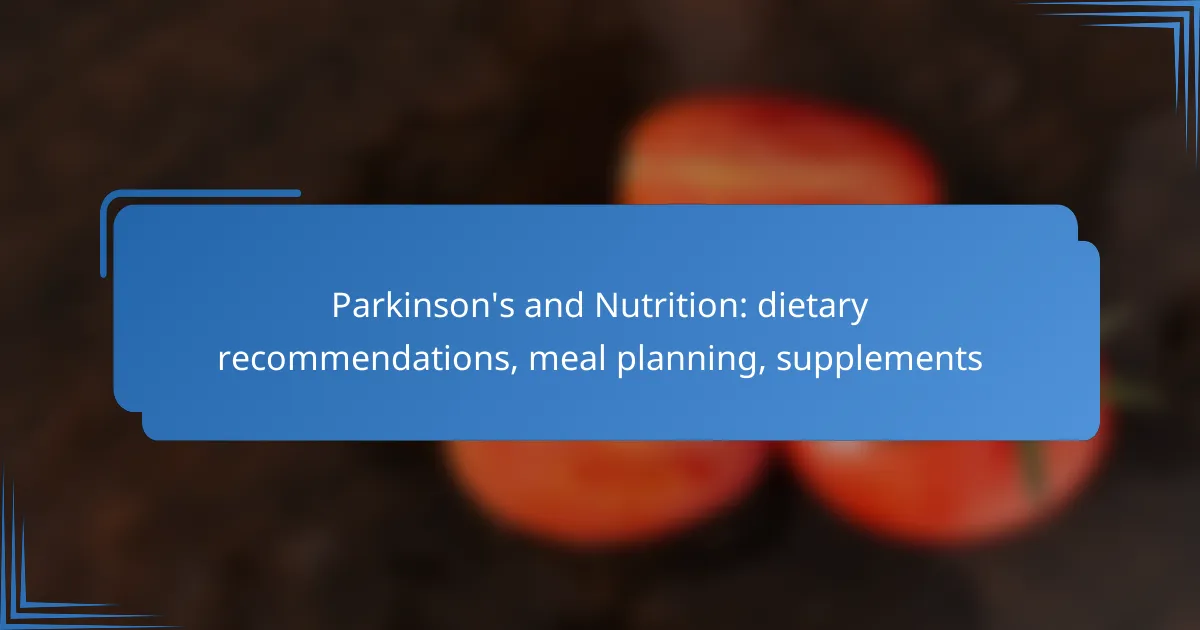For individuals with Parkinson’s disease, a balanced diet rich in essential nutrients is crucial for managing symptoms and enhancing overall health. Incorporating high-fiber foods, antioxidant-rich fruits, lean proteins, and healthy fats, along with proper hydration, can significantly improve well-being. Additionally, thoughtful meal planning ensures a consistent intake of these nutrients, while certain supplements may provide added support in managing the condition.

What dietary recommendations are best for Parkinson’s patients in New Zealand?
Parkinson’s patients in New Zealand should focus on a balanced diet rich in specific nutrients to help manage symptoms and improve overall health. Key dietary recommendations include high-fiber foods, antioxidant-rich fruits, lean protein sources, healthy fats, and proper hydration strategies.
High-fiber foods
High-fiber foods are essential for Parkinson’s patients as they help maintain digestive health and prevent constipation, a common issue. Incorporating whole grains, legumes, fruits, and vegetables into meals can significantly increase fiber intake.
Examples of high-fiber foods include oats, brown rice, lentils, apples, and broccoli. Aim for at least 25-30 grams of fiber per day to support gut health and overall well-being.
Antioxidant-rich fruits
Antioxidant-rich fruits can help combat oxidative stress, which is linked to neurodegenerative diseases like Parkinson’s. Berries, citrus fruits, and dark-skinned fruits are particularly beneficial due to their high levels of vitamins C and E.
Incorporate a variety of fruits such as blueberries, strawberries, oranges, and kiwifruit into daily meals. Aim for at least two servings of these fruits each day to maximize antioxidant intake.
Lean protein sources
Lean protein sources are important for maintaining muscle mass and supporting overall health in Parkinson’s patients. Options include chicken, fish, tofu, and legumes, which provide essential amino acids without excessive saturated fat.
Consider including fish like salmon or mackerel, which are also high in omega-3 fatty acids. Aim for two to three servings of lean protein each day to meet dietary needs.
Healthy fats
Healthy fats play a crucial role in brain health and can help reduce inflammation. Sources of healthy fats include avocados, nuts, seeds, and olive oil, which are beneficial for overall health.
Incorporate these fats into meals by using olive oil for cooking or adding nuts to salads. Limit saturated and [censured] fats to promote cardiovascular health, aiming for a balanced intake of healthy fats.
Hydration strategies
Staying hydrated is vital for Parkinson’s patients, as dehydration can exacerbate symptoms. Aim for at least 1.5 to 2 liters of fluids daily, adjusting based on activity levels and climate.
Encourage water intake throughout the day, and consider including herbal teas or broths. Monitor for signs of dehydration, such as dry mouth or fatigue, and adjust fluid intake accordingly.

How can meal planning support Parkinson’s management?
Meal planning can significantly aid in managing Parkinson’s by ensuring a balanced intake of nutrients that support overall health and well-being. A structured approach to meals can help maintain energy levels, manage weight, and address specific dietary needs associated with the condition.
Balanced meal templates
Creating balanced meal templates involves incorporating a variety of food groups to ensure adequate nutrition. A typical template might include lean proteins, whole grains, healthy fats, and plenty of fruits and vegetables. For example, a meal could consist of grilled chicken, quinoa, steamed broccoli, and a side salad with olive oil dressing.
Consider using the plate method, where half of the plate is filled with vegetables, a quarter with protein, and a quarter with whole grains. This visual guide can simplify meal planning and help maintain nutritional balance.
Portion control techniques
Portion control is crucial for managing weight and ensuring proper nutrient intake. Using smaller plates can help reduce serving sizes without feeling deprived. Aim for portions that fit within the palm of your hand for proteins and carbohydrates, while filling half your plate with vegetables.
Another effective technique is to measure servings using standard kitchen tools, such as measuring cups or a food scale. This practice can help develop a better understanding of appropriate portion sizes over time.
Meal prep tips
Meal prepping can save time and ensure that healthy options are readily available. Set aside a few hours each week to prepare meals in advance, focusing on recipes that can be easily reheated or frozen. Consider batch cooking grains and proteins, and pre-chopping vegetables for quick assembly during the week.
Labeling containers with dates and contents can help keep track of freshness and variety. Additionally, planning meals around seasonal produce can enhance flavor and nutrition while keeping costs reasonable.

What supplements are beneficial for Parkinson’s patients?
Several supplements may offer benefits for individuals with Parkinson’s disease, including Coenzyme Q10, Omega-3 fatty acids, Vitamin D, and Probiotics. These supplements can support overall health and may help manage some symptoms associated with the condition.
Coenzyme Q10
Coenzyme Q10 (CoQ10) is an antioxidant that helps produce energy in cells and may protect against oxidative stress, which is significant in Parkinson’s. Some studies suggest that CoQ10 may slow the progression of the disease, although results are mixed.
For those considering CoQ10, a typical daily dosage ranges from 100 to 300 mg. It’s advisable to consult with a healthcare provider before starting any new supplement to ensure it fits within your overall treatment plan.
Omega-3 fatty acids
Omega-3 fatty acids, found in fish oil and certain plant sources, are known for their anti-inflammatory properties. They may help improve brain health and cognitive function, which can be beneficial for Parkinson’s patients.
A daily intake of 1,000 to 2,000 mg of Omega-3s is often recommended, particularly from sources like fatty fish (salmon, mackerel) or high-quality supplements. Always check with a healthcare professional to determine the best approach for your specific needs.
Vitamin D
Vitamin D plays a crucial role in bone health and immune function, and low levels have been linked to a higher risk of neurodegenerative diseases, including Parkinson’s. Ensuring adequate Vitamin D levels may help improve overall health and potentially influence disease progression.
Many experts recommend a daily intake of 600 to 800 IU for adults, but some individuals may require higher doses based on blood tests. Sun exposure and dietary sources like fatty fish and fortified foods can also help maintain adequate levels.
Probiotics
Probiotics are beneficial bacteria that support gut health and may influence neurological health through the gut-brain axis. Some research indicates that gut health can impact the severity of Parkinson’s symptoms, making probiotics a potentially valuable addition to the diet.
When choosing a probiotic, look for products containing multiple strains and a high CFU (colony-forming units) count, typically in the billions. A daily dose of 10 billion to 20 billion CFUs is common, but it’s best to consult with a healthcare provider for personalized recommendations.

How does nutrition impact Parkinson’s symptoms?
Nutrition plays a significant role in managing Parkinson’s symptoms by influencing both physical and cognitive functions. A balanced diet can help mitigate some motor and cognitive challenges associated with the condition, supporting overall well-being.
Effect on motor function
Dietary choices can directly affect motor function in individuals with Parkinson’s disease. Nutrients such as omega-3 fatty acids, found in fish and flaxseeds, may help improve motor skills and reduce inflammation. Additionally, adequate hydration is crucial, as dehydration can exacerbate symptoms like stiffness and tremors.
Incorporating a variety of fruits and vegetables can provide essential vitamins and minerals that support muscle function and energy levels. Aim for a colorful plate, as different colors often represent different nutrients that can benefit motor performance.
Influence on cognitive health
Nutrition also impacts cognitive health in people with Parkinson’s. Diets rich in antioxidants, such as those found in berries, nuts, and leafy greens, can help protect brain cells from oxidative stress. Foods high in fiber, like whole grains and legumes, support gut health, which is increasingly recognized for its connection to brain function.
Consider including foods that are high in vitamins E and B12, as they may support cognitive function. Regularly consuming a balanced diet can help maintain cognitive abilities and potentially slow cognitive decline associated with Parkinson’s.

What are the best foods to avoid with Parkinson’s?
Individuals with Parkinson’s should avoid certain foods that may exacerbate symptoms or interfere with medication. Key categories include processed foods, high-sugar items, and excessive caffeine.
Processed foods
Processed foods often contain unhealthy fats, preservatives, and additives that can negatively impact overall health. These items may lead to inflammation and worsen Parkinson’s symptoms. Common examples include fast food, packaged snacks, and ready-made meals.
To maintain a healthier diet, focus on whole foods such as fruits, vegetables, whole grains, and lean proteins. Reading labels can help identify hidden additives and unhealthy ingredients.
High-sugar items
High-sugar items can lead to energy spikes followed by crashes, which may affect mood and motor control in individuals with Parkinson’s. Foods like candies, sugary drinks, and desserts can contribute to inflammation and weight gain as well.
Instead of sugary snacks, consider healthier alternatives like fruits or nuts. Aim to limit added sugars to less than 10% of daily caloric intake, aligning with general dietary guidelines.
Excessive caffeine
Excessive caffeine consumption can lead to increased anxiety and sleep disturbances, which can be particularly problematic for those with Parkinson’s. While moderate caffeine intake may be acceptable, it’s important to monitor how it affects individual symptoms.
Limit caffeine intake to about one to two cups of coffee per day, and consider alternatives like herbal teas or decaffeinated beverages. Keeping a diary of symptoms in relation to caffeine consumption can help identify personal thresholds.

How can caregivers assist with nutrition for Parkinson’s patients?
Caregivers play a crucial role in supporting the nutritional needs of Parkinson’s patients by ensuring they receive balanced meals and proper hydration. This assistance can involve meal planning, preparation, and encouragement to maintain a healthy diet that addresses specific challenges associated with the condition.
Meal preparation support
Meal preparation support involves helping Parkinson’s patients with cooking and organizing their meals to ensure they are nutritious and easy to consume. Caregivers can assist by preparing meals in advance, which can be stored in portion sizes for convenience. This reduces the daily burden of cooking and helps maintain a consistent dietary routine.
When preparing meals, caregivers should focus on incorporating a variety of foods rich in antioxidants, healthy fats, and fiber. Foods such as leafy greens, whole grains, and lean proteins can be beneficial. It’s also important to consider the texture of foods, as some patients may have difficulty swallowing or chewing.
To streamline meal preparation, caregivers can create a weekly meal plan that outlines what to cook each day. This plan can include easy-to-follow recipes and a shopping list, making grocery trips more efficient. Additionally, caregivers should encourage patients to participate in meal preparation when possible, as this can foster independence and enjoyment in the cooking process.
